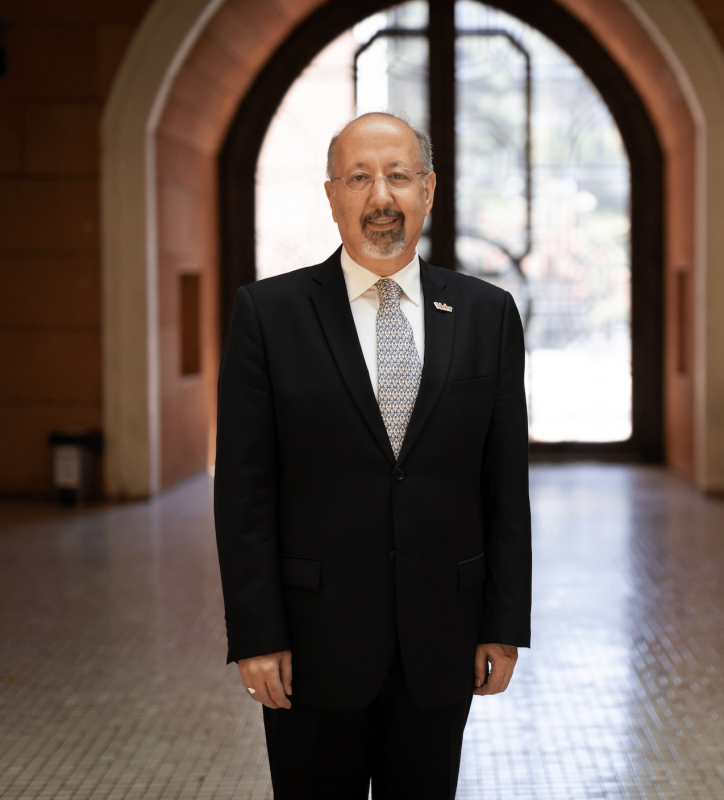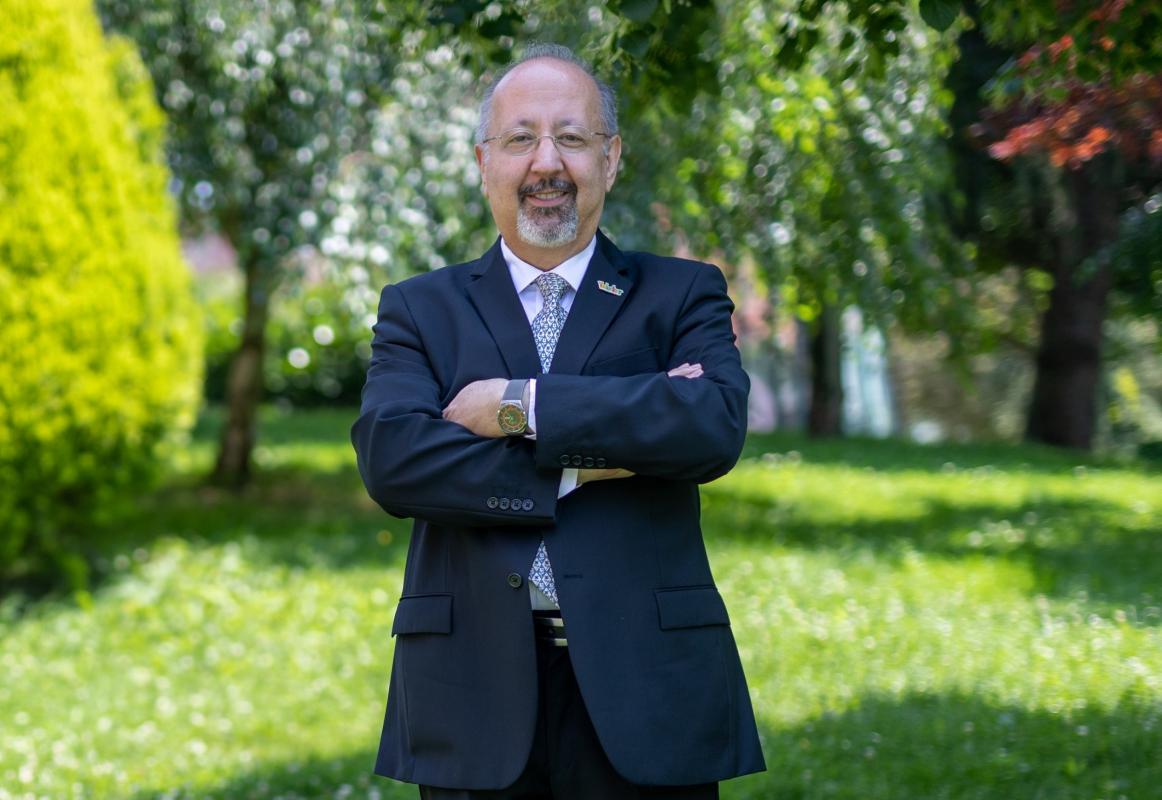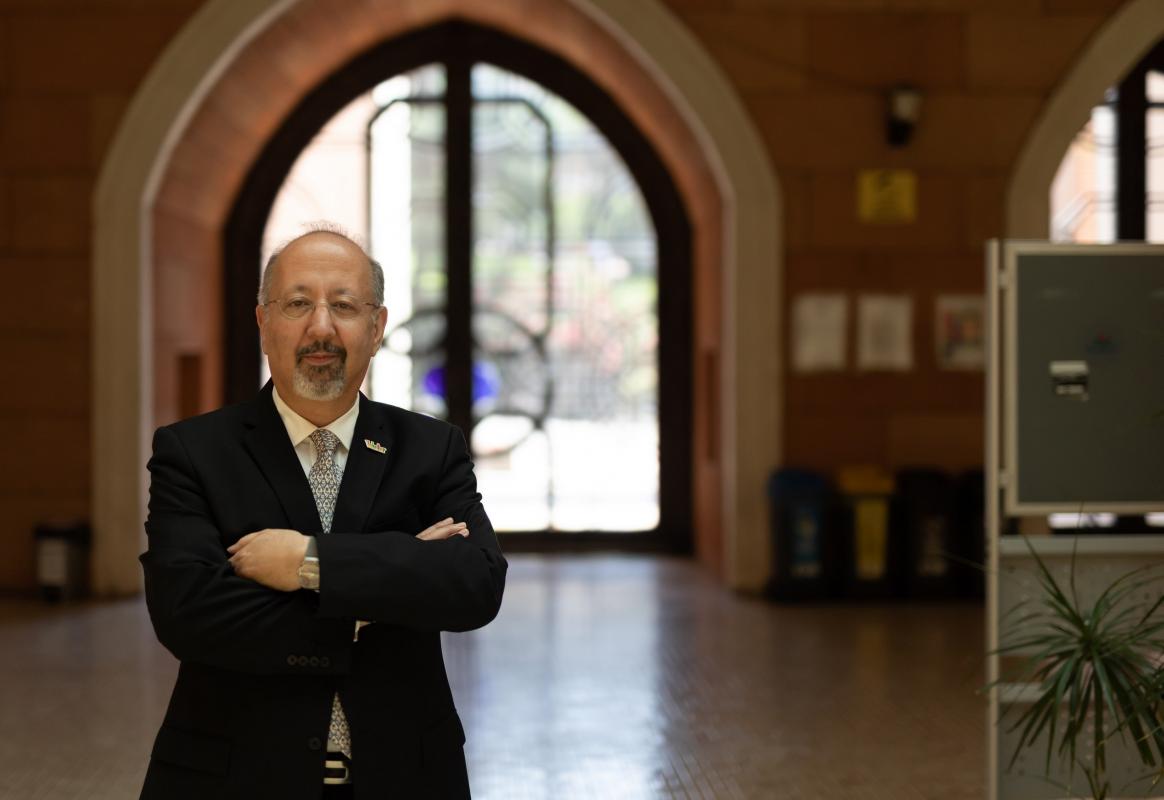He Works For Environmentally Friendly Batteries
“Success is Earned Through Collective Work”
Head of the Department of Material Science and Nanotechnology Engineering in the Faculty of Engineering, Prof. Dr. Taner Akbay completed his doctorate in England after completing his Bachelor's and Master's degree in the UK. Akbay continued his research in this country for a while and then went to Japan in order to do research on solid oxide fuel cells. Who lived on this country for about 23 years, Prof. Dr. Akbay,
returned to Turkey in order to carry ut his project entitled ''Carbon-Based Life for Rechargeable Batteries'' which is funded by TÜBİTAK within the framework of the programme ''2232 - International Leading Researchers Program''. Starting his duties at the Yeditepe University, Prof. Dr. Taner Akbay is conducting his research on ''Double Carbon Batteries'' which can be an alternative with their low cost and enviromentally friendly qualities compared to the rechargeable batteries that we use today. These batteries are intended to be used on many areas from mobile devices to the storage applications in the renewable energy systems.
Akbay, who expressed that he strived to apply a Japanese business philosophy, ''Kaisen'' both in his professional and personal life, believes that success can be achieved by collective work.

• Can we get to know you a little bit? Can you tell us about the turning points for your career and yourself?
I completed my undergraduate and Graduate studies in Metallurgical Engineering at Middle East Technical University between 1986 and 1989. I also completed my doctoral studies at Imperial College in England between 1990 and 1993. I continued my postdoctoral research at Imperial College until 1997. Then, with the support of the JSPS Fellowship provided by the Japanese government, I joined Professor Tatsumi Ishihara's group at Oita University in order to conduct research on solid oxide fuel cells. After working in this group for two years, I again took a position as an Assistant Professor in the Mechanical and Systems Engineering Department of the same university. In 2001, I decided to switch to industial sector in order to work at the Central Research Institute of Mitsubishi Materials company. I worked as a senior researcher and manager in solid oxide fuel cell R&D at Mitsubishi for about ten years. In 2013, I rejoined academic life as a professor at the Advanced Research Center for Electrical Energy Storage within the Department of Applied Chemistry of Kysuhu University, Japan.
I can say that there have been two important turning points in my professional life; the first is to go to the UK for my doctoral studies on a European Commission scholarship. The second is to have the opportunity to study and live in Japan with the support of JSPS Fellowship. Especially with my departure to Japan, the course of my career had also been determined.
Have you encountered any difficulties in your career process? How did you overcome all this?
Like everyone else, I have faced a number of difficulties in my career and my professional environment; yet especially my family and friends have made a very important contribution in order for me to overcome them.
How many years have you been working at Yeditepe University? What was your reason for choosing Yeditepe University?
I have been working here for about 1.5 years. Regarding my choice of working here, two names, Prof. Dr. Canan Aykut Bingöl, our rector and Bedrettin Dalan, our founder and honorary president have played very important notes. After a long career abroad, I had the opportunity to continue my studies in our country and at Yeditepe University to carry out my project titled ”Carbon-Based Life for Rechargeable Batteries". I am very happy to be a member of Yeditepe University, which celebrates its 25th year. This is a thing of pride for our university and for everyone who is a member of it.
“Constant Change for the Better”
Do you have a life motto?
I am trying to apply Kaizen, a Japanese business philosophy, that is, the principle of “constant change for the better”, both in my professional and personal life. I am one of those who believe that success can be achieved through collective work, not personal.
What are your hobbies? Have these made any contributions to your business life?
I think that being involved in music as an amateur has made an extremely positive contribution for myself. The Mandola, an instrument that I started to play in a Mandolin club that I joined when I was in Japan, has a meditative effect on me even if I don't have much opportunity to play it as of now. I believe that this meditative effect in question benefits me when it comes to focusing and thinking better.
“I Would Like to Be a Visionary for My Students”
Who inspires you?
When it comes to who have directly inspired me in my professional life, I can mention two academics who I have had the opportunity to work with in the UK and Japan. As someone who walked the path that both of them have opened for their students in their own ways, I would like to be able to provide a similar vision for my students.

What was the reason for your choice of Materials Science and Nanotechnology Engineering as a field of study?
To be honest, I am not one of those who make their choice of profession very consciously. As I discovered the interdisciplinary features of my profession in both my undergraduate and graduate studies, I learned that this field is extremely wide and that it has a place in every possible element that creates our modern lives. In all engineering applications that are to support and facilitate human life, for example, electronics to automotive, health sciences to defense industry, energy to the environment, there is a labour of material engineers which is designed according to the purpose.
What has been effective in starting the studies you have carried out with TUBITAK?
The core of my project, which was supported under the TUBITAK 2232 program, is actually the work of a consortium that I participated in while I was in Japan. I took part in a joint study of Kyushu University and the University of Münster on “Dual-carbon batteries” within the framework of a comprehensive battery research and development program conducted under the bilateral agreements of Japan and Germany. The project ”Carbon-Based Life for Rechargeable Batteries" was also formed on the idea of adding our country to this partnership. Of course, the valuable contributions of TÜBITAK were also extremely decisive in this.
“We Use the Techniques of Quantum Chemistry”
Can you tell us about this project of yours?
As you know, batteries have two electrodes; positive and negative. The negative electrode of lithium-ion batteries in our phones and computers that we use in our daily lives is made up of carbon, and the positive electrode is made up of nickel oxide. The transportation of the lithium-ion from one electrode to another via the electrolyte liquid inside the battery allows us to charge and discharge these batteries in our own will. In the batteries that we are working on, which we think may be a new type or alternative, both electrodes are composed of carbon. In the project, we are trying to develop a more active and safe electrolyte composition compatible with carbon electrodes at the atomic and molecular levels via the use of computational quantum chemistry techniques.
How is this expected to contribute to today's world?
Both electrodes of these batteries are made of carbon-based material. This makes them cheaper and safer compared to the lithium-ion batteries that we use today. Carbon is an eco-friendly material. The materials we use are not materials which are harmful to human health and nature. They will also be very beneficial when it comes to recycling. That's why we can call them environmentally friendly batteries. Their production will not require a special laboratory process.
In which areas can dual carbon batteries be used?
From mobile devices to storage applications in renewable energy systems, the range of their use can vary. If it is a battery used for mobile devices or consumer electronics, it will not make much difference in terms of cost. But if we are talking about a larger-capacity battery used to store electrical energy obtained from renewable energy systems, then its cost may be more affordable by 30 percent compared to those we use now.
What kind of impact has the Covid-19 pandemic had on your workfield?
The pandemic process initially had a negative effect on our research programme. We have spent most of 2020 trying to overcome supply challenges of labour, material and supply challenges. We should also remember that we are all negatively affected in a psychological manner by the process we are going through. The fact that we were not able to go to the trips we have planned brought about negative effects regarding both possible cooperations and morale. However, we have tried to overcome this by using the possibilities offered by technology and to turn this situation into an advantage.

“We Are Causing Irreversible Damage to Nature”
The ability to adapt to changing conditions, I think, also leads to the fact that humanity has an excessive level of self-confidence. With this self-confidence, we continue to cause irreversible damage to nature. I think the process we are going through is a good opportunity to evaluate. We should think more about the concept of sustainability. I think that the theme of environmental adaptation, efficiency and recycling should be a priority when developing the technologies that are necessary for modern life.
What do you think are the most important problems in the world today? What solutions can be provided for these problems?
I think that the most important problem of our world is energy access and the clean water sources that are being depleted day-by-day. I believe that material and nanotechnology engineers have a great responsibility when it comes to the solution of these problems in question. The nanotechnological applications are becoming more and more important when we consider the recovery of the sources which are disappearing rapidly. On the other hand, the orientation towards clean energy through more efficient conversion, storage and use of energy also requires the development of advanced technologies and their replacement by existing ones.
“Everything Can Be Made More Efficient and Functional”
What are your predictions about the future of your field of study?
Material Science and Nanotechnology are interdisciplinary fields of fundamental research and engineering which are very promising. From housing to our energy needs, from issues related to our health to our digital habits, everything can be made more efficient and functional, and our fields of work coincide precisely with these goals and requirements. I think that as long as humanity exists, new materials will be needed in accordance with these requirements, and therefore our profession will be quite necessary.
One of the important issues that occupy a place in the life of a scientist is travel. What would you like to say about this?
During my overseas adventure of thirty years I have had the opportunity to travel in many countries and cities of the world. I can say that traveling, seeing new places, witnessing history and meeting new people are the most important factors that have changed my perspective on many things. Istanbul is a beautiful city, but I haven't seen the places I need to see as of yet. Japan would be the headliner when it comes to my favourite countries. My favorite city is the city of Oita on the southern island of Kyushu, maybe this is because it's the first city I've been to and lived in Japan
What do you recommend for young people who want to move towards becoming researchers?
Scientific research is a bumpy process that requires continuity and perseverance. I would also advise them to be curious, questioning, patient and determined people. Conducting research is a very privileged thing as it is an extremely pleasant feeling to find solutions to problems using scientific methods and particularly, to witness the use of these solutions by humanity.